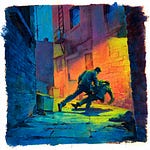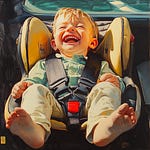Light gleamed from a polished concrete countertop as I waited for my plane to board, the glare making me nervous. I was already full of anxiety, glancing over to the corner of the cafe where my enormous, overstuffed suitcase lay doing its best impression of Mr. Creosote. I swallowed, realising that a third cup of coffee was a bad idea. I was already jittery, and the caffeine slapped my heartrate up again as it sluiced through my very nervous system. The light was blinding.
I was moving to Sydney, and I was freaking out.
Contempt
Writing in ‘Notes From a Small Island’, Bill Bryson notes he developed a “subtle contempt” for the small town he grew up in. Such contempt glows from the immortal first line of another book, ‘The Lost Continent’, in which he begins “I come from Des Moines. Somebody had to.” I recalled that line everytime I introduced myself at a party in my new city, regressing back to the smalltime island I grew up on amid jokes about incest and illiteracy.
What confused me when I arrived in Sydney was that it wasn’t only contempt. I wasn’t merely fleeing an older life, but also actively missing it. I found excuses to fly home, on average, every two months in my first few years in Sydney with a brilliant array of supra-conscious justifications; a friend’s birthday party, a winter festival, or picking up a parcel. Nothing was too trivial for a $400 round trip and 90 minute flight there and back again.
On one of these trips I sat morose with a buddy I’d left behind. He listened sympathetically as I struggled to explain this strange ambivalence of in-betweenness, all the reasons I was summoning boorish explanations for an underlying fear of change. Such realities don’t sit well with our cultural understanding of change - either we celebrate such excursions as growth adventures from which we never look back, or unnecessary distractions from the business of life, family and mission.
There is, of course, no right answer. There are only trade-offs which are foisted on anyone not born in a global city. Such feelings of ambivalence are unavoidable, no matter how much we polish the romanticism of career or home. My friends in Sydney have grown up with an unassailable privilege that is hard to articulate - if they choose to stay in Sydney, they never have to worry about the choice of giving up economic opportunities or remaining with their families. This is not true of anyone growing up in a Des Moines or Hobart. At a certain point, often very early in life, it dawns on you that you cannot have both.
Not that I’m complaining; I actually believe the quality of your life is largely determined by your ability to negotiate the presence and necessity of trade-offs. Still, it casts a dramatic light on what you have chosen to sacrifice with such a choice. With mine, I have simply chosen to see my family far less often, and I was realising through my complaints that I had implicitly chosen this pain through my explicit choice to chase success.
Fortunately when we take responsibility for the consequences of our choices we also gain a sense of autonomy. It is a gift to get to choose our suffering. For most of human existence, it was simply foisted on us via social rank and role without question. Choosing to be an economic migrant is a radical reshaping of modern identity, an electric catalyst for movement in a global economy. It also means millions of people are choosing to leave things behind that have been that way, often for a very long time.
Identity
One of those things is identity - not in the social science sense of political characteristics that form identity ‘groups’, but the way in which we choose to see and remember ourselves. Identity is a loose assemblage of memory and associations we’ve picked up over the years, that fluid, dynamic mirage we natter to all day long in our heads, who’s happiness we concern and obsess over. When we move, that identity is suddenly, violently in flux.
There is a moment when you arrive in a new place where you are presented with a vacuum. The attraction and repulsion of a new place and new people is the mold into which you can pour a new foundation. Voids can be as scary as they are enticing. The USA has built an entire economy out of making such a void as enticing as possible; Arnold Schwarzenegger filled his vacuum with a Hollywood persona to compliment Mr Olympia, and Alexander Hoysted saw Sydney as the ideal ground to build his nascent corporate career. The opportunity of Big Cities is simply a product of the greater possible connections in their network, and the gift of anonymity.
Things have worked out very well for me. The unexpected consequences actually came from the rear-view mirror; from what I left behind. When you leave a place, you leave an old identity, who’s mold has been thoroughly filled, dried out, maybe even beginning to crack. What I have learned is that this mold will never die. You will, despite your best efforts, reassume this identity the moment you land back in your home state. Everyone you love and hate from your hometown cannot help but wrestle you back into this mold, precisely because they love or hate the you that left. You have, quite by accident, made yourself a certain way and left it at home.
This drives people crazy. It’s why some people never return home - the identity they left behind is too painful to reprise. For me, it was less painful (I’m great fun at parties after all, Hobart or Sydney) and more like a t-shirt I’d outgrown. No matter what happens, it turns out, everyone has the same memories of you, the roots that keep you grounded and forever connected to a particular time and place. It’s comforting and a little suffocating. It’s a strange, paradoxical feeling Irish poet Patrick Kavanagh captures in his poem “The One”;
“Green, blue, yellow and red-
God is down in the swamps and marshes
Sensational as April and almost incred-
ible the flowering of our catharsis.
A humble scene in a backward place
Where no one important ever looked
The raving flowers looked up in the face
Of the One and the Endless, the Mind that has baulked
The profoundest of mortals. A primrose, a violet,
A violent wild iris- but mostly anonymous performers
Yet an important occasion as the Muse at her toilet
Prepared to inform the local farmers
That beautiful, beautiful, beautiful God
Was breathing His love by a cut-away bog.”
Subtle contempt isn’t actually about your hometown, if you have one you left behind. It’s the subtle contempt for who you used to be, and that’s no way to treat your former self. We all come from a bog, all possess the deeply human anxiety about where we’ve come from and what still might be chasing us. Lurking under whatever airs we cast over our identity - contempt, aloofness, pride, whatever pathology you call being a Sydneysider - is the simple truth that we cannot possess who we are. We will interrogate and ask this question all our lives.
Perhaps, if we are wise, we will be able to answer this question, but only for ourselves. Part of letting contempt for self go means allowing others to see us as they will; see us as we were, as our hometown does, who we are now, as my fellow partygoers do, and who we could become, by our hopeful selves and those rare few who enter our lives because they love us and for no other reason.
















Share this post